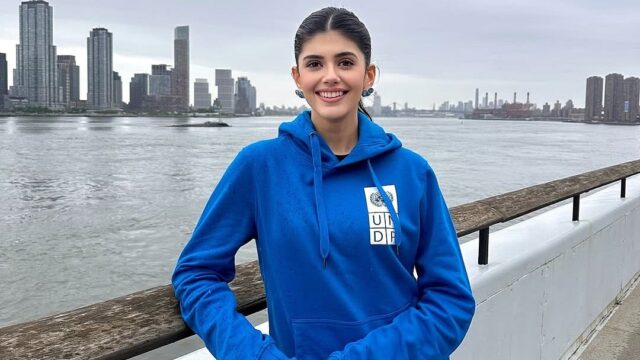From making her acting debut as a teenager in Imtiaz Ali’s Rockstar to representing India at the United Nations, Sanjana Sanghi has carved a remarkable path that bridges art, advocacy, and global impact. As UNDP India’s Youth Champion and a Distinguished Judge for the UN’s Young Leaders for the SDGs cohort, she continues to inspire a generation of young changemakers. In an exclusive interview with The Free Press Journal, Sanjana opens up about representing India on the world stage, her message to global leaders, and how she balances cinema with her humanitarian pursuits.
1. You recently served as a Distinguished Judge for the UN’s Young Leaders for SDGs cohort. How did it feel to represent India on such a global platform?
It has been a huge honour to be entrusted with the responsibility of being a Distinguished Judge for the Young Leaders for the SDGs and to join so many incredible changemakers that I’ve long looked up to, like Malala Yousufzai, Dia Mirza, and Lily Singh. It also marks the next phase in my humanitarian journey, mentoring and advising young changemakers using the experience and knowledge I’ve gained over the past decade of working in this space.
2. What stood out to you most about the young changemakers you evaluated as part of the UN panel?
What stood out most was their unwavering commitment, even in the most testing circumstances. Many of these young leaders come from war zones or drought-stricken regions, yet their determination to find innovative solutions and help their communities never wavers. It’s one thing to create movements when resources are abundant, but it’s an entirely different thing to do it while living through crisis and scarcity. That kind of resilience and purpose truly inspired me.
3. You also delivered a keynote at the UN General Assembly Hall during the Summit of the Future Action Days. What message did you hope to leave with world leaders?
My message was simple: that the youth must be the architects of their own future, not just the inheritors of it. In all the programs I’m part of, I see young people eager to lead, to make their voices heard, and to rise to the occasion, whether in the private sector or in government. But to make that possible, we must give them a seat at the tables of change. The future can’t just be planned for the youth; it must be built with them.
4. As UNDP India’s Youth Champion, how do you see the role of young Indians evolving in shaping global development conversations?
Young Indians are truly leading the way across the world in technology, health, entertainment, and every other field. Over the past decade, we’ve made incredible progress in ensuring that our impact is seen and heard globally, while still staying rooted in our Indian identity. We have the largest young demographic in the world, and that comes with immense influence on the global economy and culture. Realising this potential and leveraging it effectively is the key. I believe young Indians are not just participants in global development, they’re shaping it.
5. From addressing the UN to partnering with the World Bank, you’ve bridged cinema, advocacy, and policy. How do you balance these worlds?
That’s very kind of you to say. For me, it’s always been about following my heart and pairing that with genuine intent and hard work. I started my journey in cinema with Rockstar when I was just 13, but I always knew my heart also lay in academia. Balancing both worlds meant a lot of time management, sleepless nights, and the unwavering support of my family. When I signed Dil Bechara and also became a Delhi University Gold Medallist in the same year, it reaffirmed my belief that only we can limit our own potential.
6. You recently joined the Board of Advisors for the Millennium Campus Network alongside John Legend. What excites you most about that collaboration?
I believe it’s the shared sense of purpose and commitment to creating a better world that unites us all. Being able to share spaces and conversations with such legendary individuals, quite literally (pun intended!), is something I could not have even dreamt of.
7. Having shared global stages with icons like Dia Mirza, Malala Yousafzai, and Lilly Singh, what does this growing representation of Indian women on world platforms mean to you?
It means the world. For years, women’s voices were subdued for countless reasons. But now, there’s a new kind of fearlessness running through our veins, one that allows us to be relentless in ensuring that we are seen and heard, while doing so with grace and intention. Trailblazers like Dia, Malala, Lilly, and so many others have paved the way for the rest of us. to follow our heart and never be afraid of expressing what lies in our heart.

















































